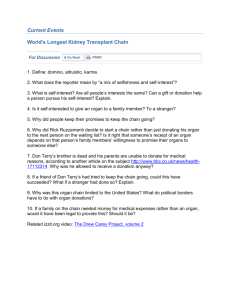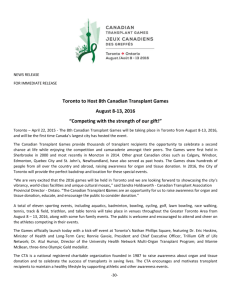Donor Sabbath Sermon
advertisement
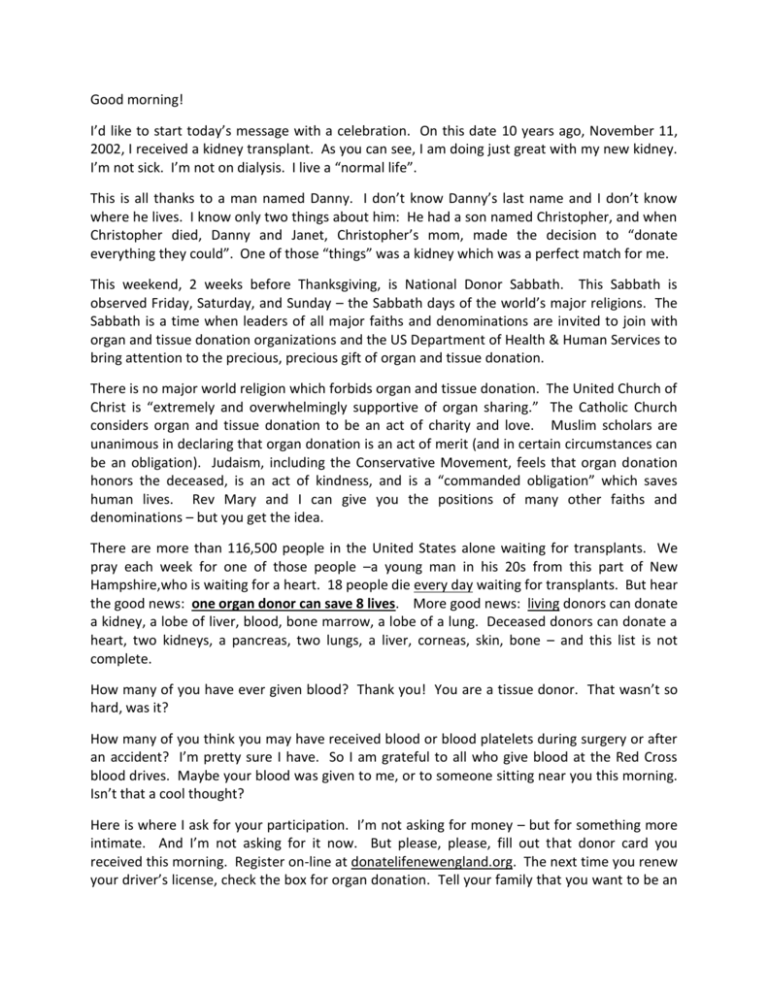
Good morning! I’d like to start today’s message with a celebration. On this date 10 years ago, November 11, 2002, I received a kidney transplant. As you can see, I am doing just great with my new kidney. I’m not sick. I’m not on dialysis. I live a “normal life”. This is all thanks to a man named Danny. I don’t know Danny’s last name and I don’t know where he lives. I know only two things about him: He had a son named Christopher, and when Christopher died, Danny and Janet, Christopher’s mom, made the decision to “donate everything they could”. One of those “things” was a kidney which was a perfect match for me. This weekend, 2 weeks before Thanksgiving, is National Donor Sabbath. This Sabbath is observed Friday, Saturday, and Sunday – the Sabbath days of the world’s major religions. The Sabbath is a time when leaders of all major faiths and denominations are invited to join with organ and tissue donation organizations and the US Department of Health & Human Services to bring attention to the precious, precious gift of organ and tissue donation. There is no major world religion which forbids organ and tissue donation. The United Church of Christ is “extremely and overwhelmingly supportive of organ sharing.” The Catholic Church considers organ and tissue donation to be an act of charity and love. Muslim scholars are unanimous in declaring that organ donation is an act of merit (and in certain circumstances can be an obligation). Judaism, including the Conservative Movement, feels that organ donation honors the deceased, is an act of kindness, and is a “commanded obligation” which saves human lives. Rev Mary and I can give you the positions of many other faiths and denominations – but you get the idea. There are more than 116,500 people in the United States alone waiting for transplants. We pray each week for one of those people –a young man in his 20s from this part of New Hampshire,who is waiting for a heart. 18 people die every day waiting for transplants. But hear the good news: one organ donor can save 8 lives. More good news: living donors can donate a kidney, a lobe of liver, blood, bone marrow, a lobe of a lung. Deceased donors can donate a heart, two kidneys, a pancreas, two lungs, a liver, corneas, skin, bone – and this list is not complete. How many of you have ever given blood? Thank you! You are a tissue donor. That wasn’t so hard, was it? How many of you think you may have received blood or blood platelets during surgery or after an accident? I’m pretty sure I have. So I am grateful to all who give blood at the Red Cross blood drives. Maybe your blood was given to me, or to someone sitting near you this morning. Isn’t that a cool thought? Here is where I ask for your participation. I’m not asking for money – but for something more intimate. And I’m not asking for it now. But please, please, fill out that donor card you received this morning. Register on-line at donatelifenewengland.org. The next time you renew your driver’s license, check the box for organ donation. Tell your family that you want to be an organ donor – if they don’t know your wishes, the donation may not happen, even if you are a registered donor. Tell your doctors. Make sure the information is part of your living will, so that the person who may be making end-of-life decisions for you knows your wishes. This will make no difference in your medical care – the transplant team is totally different from the medical team treating you and trying to save your life. You are never too old to donate. The oldest organ donor on record was just short of his 93 rd birthday. You can donate even if you have medical issues yourself. I took myself off the donor registry when my kidneys failed and I went on the transplant list – and last week I put myself back on. There’s nothing wrong with my skin, my bones, my heart, my lungs. My eyes are going, and my hearing’s about gone, but parts of me are still in pretty good shape! And when I have no more use for those parts, I’d really like someone else to get some use from them. Please be sure to read the material included in your bulletin this morning. And on your way out, please take a “Donor Sabbath” pin from the basket on the table. Please consider sharing the gift of life. I’d like to close with a few quotes from the website organdonor.gov. Yeon Won Bae, kidney recipient, says: “In this world, there is no greater love than the altruistic love of sharing and giving a life.” Christina Janis, cornea recipient, says: “The giving of oneself is just the ultimate way of saying thank you for being created.” And Linda Cheatham, kidney recipient, says: “We are alive. We are here and we thank you, thank you, thank you.” Amen and amen.
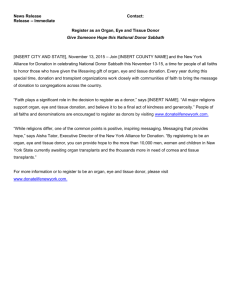
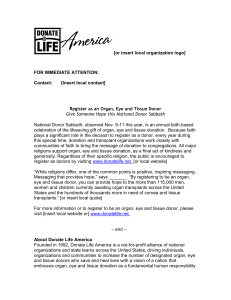
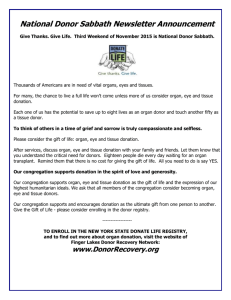


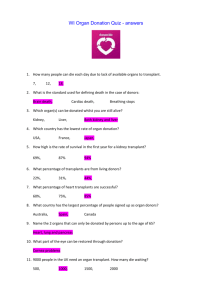
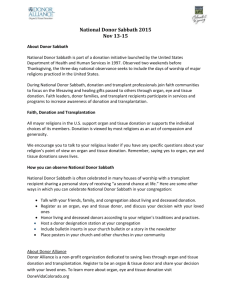
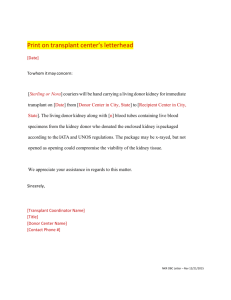
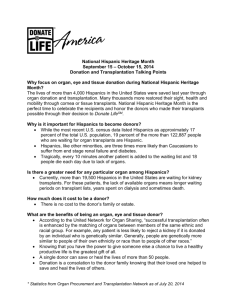
![[Insert hospital logo] [Hospital Name] Joins New York Organ Donor](http://s3.studylib.net/store/data/006915859_1-ff8bf176c29fb3e738e573a1a0d39917-300x300.png)
